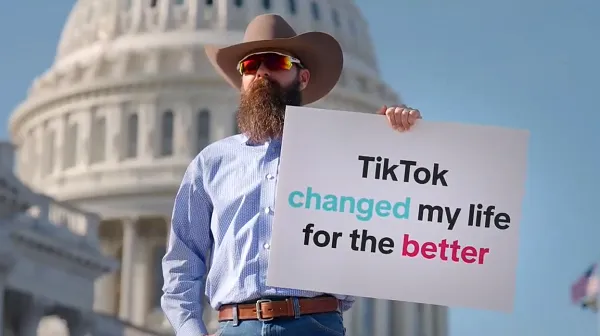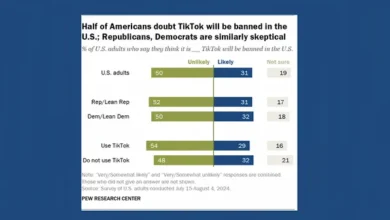
TikTok’s pulling out all the stops to oppose the sell-off bill proposed in the U.S., which would force its owner ByteDance to sell the app to a U.S. company in order to address potential national security concerns.
TikTok’s latest effort on this front is a new, $2.1 million ad campaign, which aims to showcase the benefits that TikTok provides to U.S. users.
The campaign will be aired on T.V. in the U.S., with a specific focus on states that face tough battles in the upcoming election.
As explained by CNBC:
“The company has reserved television ad space in the battleground states of Nevada, Montana, Wisconsin, Pennsylvania and Ohio, according to data from AdImpact. All five states are represented by vulnerable Senate Democrats, each of whom is running for another six-year term.”
The idea is that this will put more pressure on these senators to oppose the TikTok bill, which expands on TikTok’s broader effort to highlight the benefit of the app for U.S. businesses.
Though the premise of these ads is misleading, in that they amplify the suggestion that TikTok would be banned as a result of the under consideration bill.
Which isn’t what the bill states.
Under the proposal, TikTok would be forced into U.S. ownership in order to alleviate concerns around the potential influence of foreign adversaries on the American public. With U.S./China tensions increasing on several fronts, the primary concern is that TikTok could be used as a propaganda tool to influence U.S. voters, based on the history of Chinese influence operations more broadly, and on TikTok’s own direct links to the C.C.P.
In China, ByteDance works closely with the Chinese Government on content controls and regulations. To be clear, those controls do not expand to TikTok, which only operates outside of China itself. But again, the history of Chinese influence operations in other nations does suggest that TikTok could be a target for the same.
In 2022, for example, Google disrupted over 50,000 instances of a Chinese influence program called “Dragonbridge” across YouTube, Blogger, and AdSense, while Meta has also detected many instances of Chinese influence operations, with the company removing almost 5,000 Facebook profiles linked to one such program in Q3 alone last year.
Given this, a Chinese-owned app seems like a potential vector for the same, while previous reports have also suggested that Chinese officials have at least attempted to influence trends on TikTok, in order to present a more favorable view of CCP policies.
Investigations have also indicated that hundreds of current ByteDance and TikTok employees once worked for Chinese state media.
Given the various considerations, there does seem to be a case for consideration of a TikTok sell-off push, and again, the U.S. Government continues to clash with China over the war in Ukraine, control of the South China Sea, Taiwan, etc.
There are various reasons that could be behind the new sell-off push, which is being pushed by cybersecurity experts. But again, this is not a ban, as TikTok suggests, it’s a sell-off based on such concerns.
Though the C.C.P. has reportedly signaled that it will not allow a forced sell-off of the app either way, which could result in a full ban. But that’s not what the actual proposal dictates, and TikTok’s continued misleading statements on this front have also reportedly rankled some senators.
Still, TikTok seems determined that this is the best way forward to oppose the bill. Though seeking to oppose a bill based on your perceived influence by using that influence to oppose it may also not work in the app’s favor.
The bill could take some time to reach the next stage, and you can expect TikTok to keep pushing to maintain its ownership structure.
Source link




